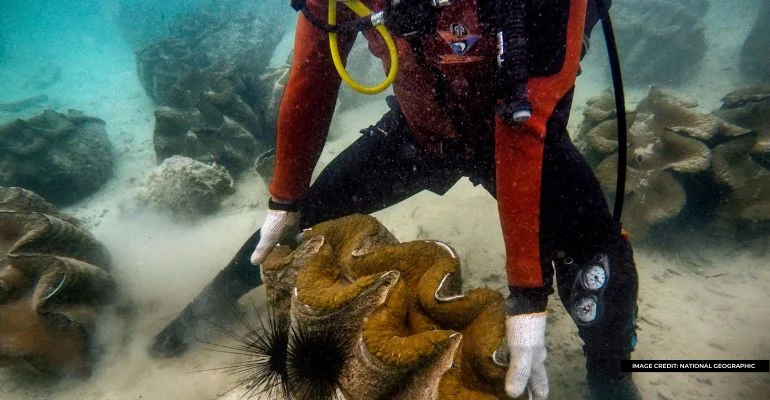MANILA, PHILIPPINES– A new study says that China’s dredging and clam harvesting destroyed reefs that cover almost 20,000 acres in the South China Sea (West Philippine Sea).
On Thursday, a study by Monica Sato of the Asia Maritime Transparency Initiative (AMTI) revealed that Chinese fishermen damaged 16,353 acres of coral reef in disputed waters.
Sato said that giant clams are famous in China because their shells resemble elephant ivory.
“So, because it’s so similar to ivory, it became very popular in Chinese statuary, jewelry, and was sold for very high prices. The most expensive processed giant clam was sold for about USD106,000,” she said.
In 2023, Sato’s Deep Blue Scars study revealed environmental threats to the South China Sea, examining 181 space images of inhabited and uninhabited areas.
The study found that China’s attempts to build islands were also to blame for damaging another 4,000 acres of coral reef in the area.
Between 2013 and 2017, China primarily utilized cutter-suction dredging for dredging and landfilling, cutting through reefs and transferring sediments through floating pipes.
“Just try to imagine a drill going through the reef— that’s essentially what China’s doing,” she explained.
According to the study, dredging has always been bad for the environment. However, some claims “have a history of using less destructive dredging methods.”
Vietnam’s clamshell dredges are used to remove shallow reef parts, causing slower and less harm to surrounding areas.
“When we totaled, we found that China has destroyed 4,500 acres of reef through dredging and landfill, Vietnam comes in second with 1,500 acres of reefs destroyed, and Malaysia and the Philippines and Taiwan barely scratched the surface— they contribute to less than 100 acres of destroyed reefs,” she said.
AMTI Director Greg Poling emphasized the need for international cooperation to address the environmental damage in the South China Sea.
He suggested that an international coalition led by Southeast Asian claimants should conduct surveys to assess the damage and implement fisheries management regimes.
Poling highlighted the importance of engaging Beijing to mitigate further environmental degradation in the region, stating that physical prevention would only be possible with Chinese cooperation.
Keep Reading: PH replaces traditional jeepneys with Chinese imports

Leave a Reply